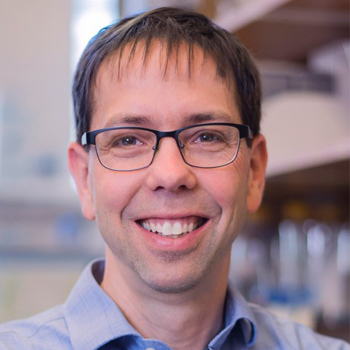Kuhlman solves protein puzzles with a modeling program
The American Society for Biochemistry and Molecular Biology has given the 2019 DeLano Award for Computational Biosciences to Brian Kuhlman, a professor of biochemistry and biophysics at the University of North Carolina School of Medicine. The award recognizes scientists whose work excels in two key elements: “more productive use of computers to accelerate and facilitate research, and ready access of these programs for the scientific community.”

“What a fantastic honor! Warren DeLano’s software, PyMOL, is a terrific example of what can be achieved by making research tools easily accessible. It has been very rewarding to contribute to the Rosetta software and community in the same way, and it is exciting to see all of the wonderful proteins that are being designed with Rosetta.”
— BRIAN KUHLMAN
Kuhlman’s studies have done exactly that; Ruth Nussinov of the National Cancer Institute wrote in her nomination letter, “I cannot think of a more deserving recipient than Prof. Kuhlman.”
Kuhlman’s work can be described broadly as using computers and computational biology to design new protein structures and functions. As a postdoc in David Baker’s laboratory, Kuhlman created a protein design module in the molecular modeling software Rosetta. As a professor, he has continued to advance the uses of Rosetta in several forms: protein interface design, antibody assembly and engineering photoactivatable proteins. He makes the modules available to all researchers.
In the field of protein interface design, Kuhlman’s lab has redesigned proteins to increase their affinity to binding partners and has designed interfaces that allow previously nonbinding proteins to bind each other or other substrates they would not typically bind. This has achieved binding with micro to nanomolar affinities, and the experimentally determined structures of his designed interfaces typically were quite similar to his models, showing how effective his modeling techniques are. This work and his freely available Rosetta modules open the doors for many researchers to use these ideas in countless other fields.
Gideon Schreiber of the Weizmann Institute of Science wrote in support of the nomination that Kuhlman “is known for driving technology as well as using it in biologically important applications.”
Kuhlman’s group has worked to solve the longstanding problem of creating bispecific antibodies, antibodies that bind two different antigens, by creating a novel protocol for multi-state protein design. They generated two different light and heavy chains with orthogonal interfaces that can be assembled with high fidelity. This has significant potential in any field where two cellular structures need to be brought in close proximity, including cancer immunotherapy.
The lab is also working on creating protein switches that can be turned on or off using light with high spatial and temporal resolution. They are designing these switches to control intracellular localization, gene expression and differentiation.
Kuhlman is known among his colleagues as an innovative and reliable scientist, an effective and wise collaborator, and a superb speaker. This is shown in his high (and increasing) number of citations, his many papers written in collaboration with other labs and the many talks he gives around the world.
Kuhlman will receive his award during the ASBMB annual meeting at the Experimental Biology 2019 conference in Orlando, where he will deliver an award lecture titled “Designing novel protein structures and interactions with Rosetta” at 1:45 p.m. April 9 in Valencia Ballroom A at the Orange County Convention Center.
Enjoy reading ASBMB Today?
Become a member to receive the print edition four times a year and the digital edition monthly.
Learn moreGet the latest from ASBMB Today
Enter your email address, and we’ll send you a weekly email with recent articles, interviews and more.
Latest in People
People highlights or most popular articles

The data that did not fit
Brent Stockwell’s perseverance and work on the small molecule erastin led to the identification of ferroptosis, a regulated form of cell death with implications for cancer, neurodegeneration and infection.

Building a career in nutrition across continents
Driven by past women in science, Kazi Sarjana Safain left Bangladesh and pursued a scientific career in the U.S.

Kiessling wins glycobiology award
She was honored by the Society for Glycobiology for her work on protein–glycan interactions.

2026 ASBMB election results
Meet the new Council members and Nominating Committee member.

Simcox wins SACNAS mentorship award
She was recognized for her sustained excellence in mentorship and was honored at SACNAS’ 2025 National Conference.

From humble beginnings to unlocking lysosomal secrets
Monther Abu–Remaileh will receive the ASBMB’s 2026 Walter A. Shaw Young Investigator Award in Lipid Research at the ASBMB Annual Meeting, March 7-10 in Washington, D.C.

